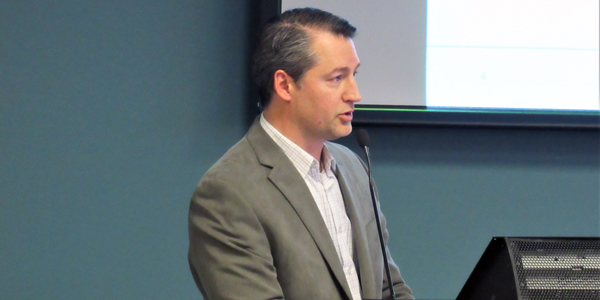By Amanda Durish Cook
CARMEL, Ind. — MISO says it will seek to alter SPP’s practice of levying unreserved transmission use penalties on MISO load-serving entities when the charges pose a deterrent to building interregional projects.
Eric Thoms, MISO manager of interregional planning and coordination, last week said the RTO’s other contract path sharing agreements with PJM and Ontario’s Independent Electricity System Operator allow for use of transmission service when a normal feed is open and joint contract path capacity is used to serve load.
It likewise does not charge for transmission service when non-MISO LSEs use its transmission under contract path sharing.
But SPP does not acknowledge contract path sharing, instead issuing MISO LSEs bills for transmission service and unreserved usage penalties. Thoms said MISO is concerned those charges could extend to future interregional projects cost-shared between the two RTOs.
Thoms likened SPP’s charges to the early days of cellphone contracts before shared plans, when bandwidth could be exceeded only with bill increases.
“Should MISO and SPP approve an interregional project, under certain qualifying conditions, MISO members could be expected to acquire transmission service or be subject to unreserved usage penalties in addition to MISO’s cost of an interregional project,” Thoms said during a June 13 Planning Advisory Committee meeting. He recommended that the RTOs seek a compromise in the JOA that exempts MISO members from SPP’s additional transmission service or unreserved usage penalties for any future interregional projects.
“We got a shadow of evidence that this could be an issue in the last [coordinated system plan] study,” Thoms said, saying that considerable MISO load on one proposed interregional project could have seen SPP charging transmission fees on MISO LSEs.
MISO and SPP have never approved an interregional project, despite conducting two coordinated system plan studies. Thoms said stakeholders attending the PAC have suggested that SPP’s current practices “may be an impediment to interregional projects with SPP.” Some MISO stakeholders in public meetings have said a first-ever interregional project will continue to be elusive until RTOs have comparable transmission usage charges.
Thoms said some stakeholders have suggested MISO “reciprocate” and use SPP’s interpretation of transmission charges, but he discouraged the idea.
“That would also have broader implications on how contract paths are interpreted,” Thoms said. “This is in the spirit of trying to remove impediments to mutually beneficial interregional projects.”
Thoms said MISO staff will next approach the MISO-SPP Joint Planning Committee to seek a negotiation of the unreserved use charge practice with respect to interregional projects.
David Kelley, SPP director of seams and market design, said his RTO’s Seams Steering Committee is aware of MISO’s position on the “potential unreserved use charges under SPP’s Tariff and their perceived impact to future SPP-MISO interregional projects.”
“SPP looks forward to further discussions with SPP and MISO stakeholders during future [Interregional Planning Stakeholder Advisory Committee] meetings as we continue to look for ways to remove barriers to developing mutually beneficial transmission projects,” Kelley told RTO Insider.
MISO-SPP Interregional Changes
Meanwhile, MISO is still committed to making its interregional project process with SPP more scalable by removing the $5 million cost threshold and the RTOs’ joint model requirement, while adding an avoided cost benefit metric in addition to the adjusted production cost savings for interregional projects. (See MISO, SPP Look to Ease Interregional Project Criteria.)
“It’s a herculean effort to build a joint model. It takes several months, and it’s essentially another screen,” Thoms said, adding that MISO hopes to file a JOA change with FERC by the end of the year.
MISO and SPP said the 15 stakeholders that provided feedback to a spring survey were divided over whether to eliminate the joint model.
“Several stakeholders believed removing the joint model would eliminate barriers and streamline the process. Others expressed concern about equitable cost allocation, lack of joint collaboration and study timelines,” MISO said.
MISO also noted a majority of the stakeholders responding to the survey support removing the $5 million cost threshold.
MISO and SPP stakeholders will have a chance to discuss the proposed JOA changes at a July IPSAC meeting, for which no date has been set.





